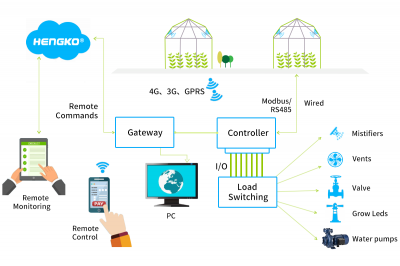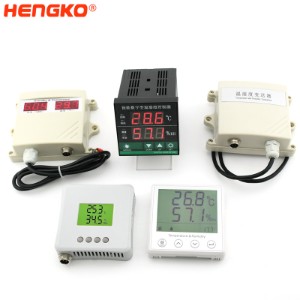IoT solutions enable us to improve yields and solve the chemical-physical, biological and socio-economic problems associated with crops and agricultural systems.
The IoT enables the detection, monitoring, and control of a wide range of critical agricultural data over very long distances (more than 15 km), using HENGKO temperature and humidity sensors to monitor air and soil temperature and humidity conditions; weather, rainfall, and water quality; air pollution; crop growth; livestock location, condition and feed levels; intelligently connected harvesters and irrigation equipment; and more.
The smart agriculture market continues to grow, and it is easier to address these issues through IoT solutions.
I. Field pasture optimization.
The quality and quantity of pasture vary depending on weather conditions, location, and past grazing use. As a result, it is difficult for farmers to optimize the location of their cattle daily, even though this is a crucial decision that directly affects yield and profitability.
It is possible to communicate via wireless networks that take advantage of the macro-diversity of agricultural areas to provide robust data collection. All wireless base stations have a coverage range of 15 km and collaborate to provide seamless indoor and outdoor coverage throughout the agricultural area.
II. Soil Moisture
Soil moisture and its effectiveness in supporting plant growth is a significant factor in farm productivity. Too little moisture can lead to yield loss and plant death. On the other hand, too much can lead to root disease and water waste, so good water management and nutrient management are critical.
The HENGKO Soil Moisture Meter monitors the water supply to crops on or off-site, ensuring they always receive the correct amount of water and nutrients for optimal development.
III. Water Level Control
Leakage or incorrect water conditions can ruin crops and cause substantial economic losses. The Water Level Assessment Kit allows accurate river and other levels monitoring via LoRaWAN devices. The solution uses ultrasonic sensors to provide the best compromise when accurate and repeatable distance measurements are required.
IV. Tank Monitoring.
Companies that manage remote storage tanks daily reduce waste and save money. An automated tank monitoring system can now reduce the need to visit each tank individually to check that the water level is correct.
Over the past few decades, these IoT devices have also been tailored to adapt to sustainability issues and constraints while accommodating a growing global population (set to reach 70% by 2050), putting tremendous pressure on agriculture that must be able to meet a demanding society that meets current needs while coping with water scarcity and changing climate and consumption patterns. These issues are driving farmers to find solutions to facilitate and automate their work and must monitor their production conditions to keep up. Using various sensors such as temperature and humidity, gas, moisture, pressure, etc., can effectively meet the needs of the IoT and farmers' monitoring needs to save time and effort.
Post time: Aug-19-2022







